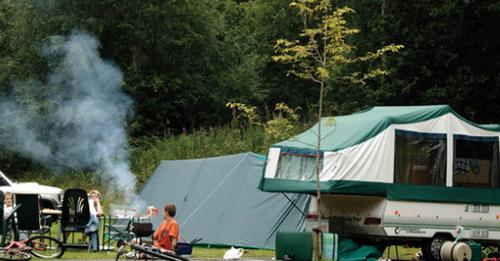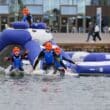
Caravanning and camping is an amazing away to just pack up, get out there and discover everything that Armagh, Banbridge and Craigavon Borough has to delight and inspire you. The freedom, beauty and facilities at Kinnego Marina Caravan & Camping Park, Clare Glen Caravan Park and Gosford Forest Park Camping & Caravanning are attracting more and more people to pitch up and chill out while surrounded by nature.
Prepare for outdoor adventure with extensive walking and cycling trails and an exhilarating range of sporting activities at South Lake Watersports Centre, Craigavon Golf & Ski Centre, Loughgall Country Park & Golf Course, Gosford Forest Park, Kinnego Marina and Clare Glen
Booking systems opening times
Kinnego Marina – Friday January 21, at 10.00am
Gosford Forest Park – Monday January 24, at 10.00am.
Clare Glen -Tuesday January 25, at 10.00am.
7 Principles of leave no trace
The Leave No Trace programme is designed to help outdoor enthusiasts value the natural environment, to understand the impact of our activities, and to enable us make decisions to minimise that impact while still enjoying our activities with freedom.
1. Plan Ahead And Prepare
- Before you go check, where possible, if access is allowed and your activity is permitted in the area you wish to visit.
- Respect any signs, regulations, policies and special concerns for the area that you wish to visit. Permits may sometimes be needed for activities on public lands.
- Where possible travel by public transport or share cars; consider the availability of parking.
- Ensure you have the skills and equipment needed for your activity and to cope with emergencies that could arise.
- Check the weather forecast and always be prepared for changing weather conditions.
- For environmental and safety reasons, and to minimise your impact on other
- users, keep group numbers small; split larger parties into smaller groups.
2. Be Considerate Of Others
- Respect the people who live and work in the countryside.
- Park appropriately – avoid blocking gateways, forest entrances or narrow roads. Remember that farm machinery, local residents and the emergency services may need access at all times.
- Take care not to damage property, especially walls, fences and crops
- Respect other visitors and protect the quality of their experience.
- Let nature’s sounds prevail. Keep noise to a minimum.
3. Respect Farm Animals And Wildlife
- Dogs should be kept under close control and should only be brought onto hills or farmland with the landowner’s permission.
- Observe wild animals and birds from a distance. Avoid disturbing them, particularly at sensitive times: mating, nesting and raising young (mostly between spring and early summer).
- Keep wildlife wild, don’t feed wild animals or birds – our foods damage their health and leave them vulnerable to predators.
- Farm animals are not pets; remain at a safe distance.
4. Travel And Camp On Durable Ground
Durable ground includes established tracks and campsites, rock, gravel, dry grasses or snow.
In popular areas:
- Concentrate use on existing tracks and campsites.
- To avoid further erosion, travel in single file in the middle of the track even when
- wet or muddy.
In more remote areas:
- Disperse use to prevent the creation of new tracks and campsites.
- Avoid places where impacts are just beginning to show.
If camping :
- Protect water quality by camping at least 30m from lakes and streams.
- Keep campsites small and discreet
- Aim to leave your campsite as you found it, or better.
5. Leave What You Find
- Respect property. For example, farming or forestry machinery, fences, stone walls etc. Leave gates as you find them (open or closed).
- Preserve the past: examine – without damaging – archaeological structures, old walls and heritage artefacts e.g. holy wells, mine workings, monuments.
- Conserve the present: leave rocks, flowers, plants, animals and all natural habitats as you find them. Fallen trees are a valuable wildlife habitat; do not remove or use for firewood.
- Avoid introducing non-native plants and animals e.g. zebra mussels in rivers and lakes.
- Do not build rock cairns, structures or shelters.
6. Dispose Of Waste Properly
- “If You Bring It In, Take It Out” – take home all litter and leftover food (including tea bags, fruit peels and other biodegradable foods).
- To dispose of solid human waste, dig a hole 15-20cms deep and at least 30m from water, campsites and tracks. Cover and disguise the hole when finished.
- Bring home toilet paper and hygiene products.
- Wash yourself or your dishes 30m away from streams or lakes and if necessary use small amounts of biodegradable soap. Bring home any solids and scatter strained dishwater.
7. Minimise The Effects Of Fire
Fires can cause lasting impacts and be devastating to forests, natural habitats and farmland. Therefore when camping use a lightweight stove for cooking.
Where fires are permitted:
- Use established fire rings, barbecues or create a mound fire.
- Keep fires small. Only use sticks from the ground that can be broken by hand. Do not use growing vegetation for use as firewood.
- Avoid burning plastics or other substances: which emit toxic fumes.
- Burn all fires to ash, put out fires completely, and then scatter cool ashes.
For further information, click here






